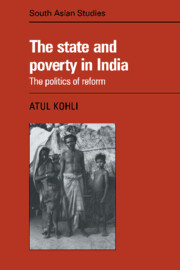Book contents
- Frontmatter
- Contents
- List of Tables and Figures
- Acknowledgements
- Introduction
- 1 The State and Redistributive Reforms
- 2 Democracy and Development in India: an Interpretation
- 3 West Bengal: Parliamentary Communism and Reform from above
- 4 Karnataka: Populism, Patronage, and Piecemeal Reform
- 5 Uttar Pradesh: Political Fragmentation, Middle-Peasant Dominance, and the Neglect of Reforms
- 6 Conclusion: The State and Reform in Democratic–Capitalist Development
- Appendix I On the Political Relevance of Social Classes in a Developmental Setting
- Appendix II Does Agriculture Growth Really “Trickle-down” in India?
- Bibliography
- Index
- CAMBRIDGE SOUTH ASIAN STUDIES
6 - Conclusion: The State and Reform in Democratic–Capitalist Development
Published online by Cambridge University Press: 27 October 2009
- Frontmatter
- Contents
- List of Tables and Figures
- Acknowledgements
- Introduction
- 1 The State and Redistributive Reforms
- 2 Democracy and Development in India: an Interpretation
- 3 West Bengal: Parliamentary Communism and Reform from above
- 4 Karnataka: Populism, Patronage, and Piecemeal Reform
- 5 Uttar Pradesh: Political Fragmentation, Middle-Peasant Dominance, and the Neglect of Reforms
- 6 Conclusion: The State and Reform in Democratic–Capitalist Development
- Appendix I On the Political Relevance of Social Classes in a Developmental Setting
- Appendix II Does Agriculture Growth Really “Trickle-down” in India?
- Bibliography
- Index
- CAMBRIDGE SOUTH ASIAN STUDIES
Summary
This study has focused on the patterns of state intervention for socio-economic reforms in rural India. Empirical materials have been investigated from a theoretical standpoint emphasizing the state – society interactions within contemporary capitalist development. The study has analyzed the interventionist role of the Indian Central Government and compared the reformist performance of three provincial governments within India, namely, the Communist Government in West Bengal (1977-84) the Congress Government in Karnataka (1974-80), and the Janata Government in Uttar Pradesh (1977-80). Governmental intervention in three policy areas has been studied: land reforms, small-farmer schemes, and wage- and employment-generation projects for the landless. Having presented this material, I now intend to pull together the various strands of the argument, summarize the findings, and draw out the theoretical implications of the study.
The general issue under consideration here has been the political conditions under which developmental reform from above does or does not succeed. The argument suggested by the materials analyzed is that within similar social–structural conditions, differences in regime type are of considerable consequence for the effectiveness of state-initiated redistribution. The analysis of the Indian Central Government's economic role highlights how the perpetuation of poverty in that country has resulted from an increasingly institutionalized pattern of domination involving an alliance between a loosely organized nationalist elite and entrepreneurial classes. The range of redistributive choices available within this larger constraint of democratic capitalism emerges from the comparative analysis of Indian regional materials. A well organized, parliamentary–communist regime in West Bengal has successfully initiated redistributive programs.
- Type
- Chapter
- Information
- The State and Poverty in India , pp. 223 - 236Publisher: Cambridge University PressPrint publication year: 1987



